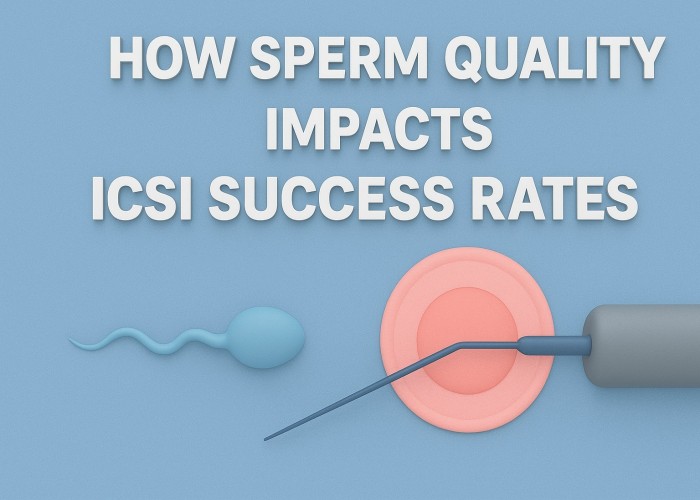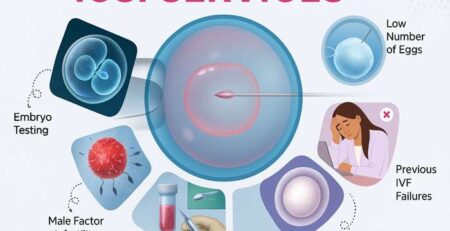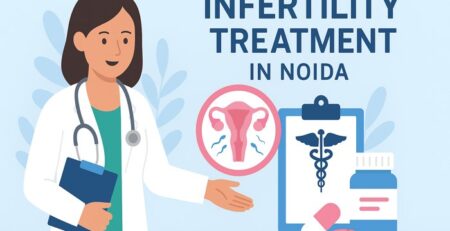How Sperm Quality Impacts ICSI Success Rates
For couples facing infertility, assisted reproductive technologies like IVF and ICSI have provided new hope. Among these, Intracytoplasmic Sperm Injection (ICSI) has become one of the most effective treatments, particularly for male infertility. But an important factor often overlooked is how sperm quality directly impacts the success rates of ICSI. How Sperm Quality Impacts ICSI Success Rates.
In this detailed guide, we will explore the role of sperm quality in fertility, why it matters in ICSI procedures, and how couples can take the right steps to improve their chances of success.
Understanding ICSI: A Quick Overview
ICSI, or Intracytoplasmic Sperm Injection, is an advanced form of IVF where a single healthy sperm is directly injected into an egg to achieve fertilization. This procedure is particularly beneficial for couples dealing with:
- Low sperm count
- Poor sperm motility
- Abnormal sperm shape (morphology issues)
- Previous failed fertilization attempts with IVF
With ICSI, even men with severe sperm-related issues have a chance of achieving pregnancy. However, the quality of sperm still plays a vital role in determining the overall outcome.
Why Sperm Quality Matters in ICSI
Even though ICSI involves injecting just one sperm into an egg, the health of that sperm is crucial. Poor sperm quality can affect the following stages:
- Fertilization Potential
- Healthy sperm increases the chances of successful fertilization. How Sperm Quality Impacts ICSI Success Rates.
- Sperm with DNA damage or poor motility may lead to lower fertilization rates.
- Embryo Development
- High-quality sperm contributes to healthy embryo formation.
- Damaged sperm DNA may lead to poor embryo quality, affecting implantation.
- Pregnancy Success
- Couples with healthier sperm samples generally see higher ICSI success rates.
- Poor sperm quality may increase the chances of miscarriage or failed implantation.
Factors That Affect Sperm Quality
Several lifestyle, medical, and environmental factors influence sperm health:
- Age – Sperm quality decreases with age, impacting DNA integrity.
- Lifestyle Habits – Smoking, alcohol, lack of sleep, and poor diet reduce sperm health.
- Medical Conditions – Varicocele, hormonal imbalance, and chronic illnesses play a role.
- Environmental Exposure – Heat, radiation, and toxins can lower sperm count and motility.
- Stress – High stress is linked to reduced testosterone and poor sperm production.
How Sperm Quality is Measured
When couples seek fertility treatment in Noida, semen analysis is one of the first steps. This test checks for:
- Sperm Count – Number of sperm in the sample.
- Motility – Ability of sperm to move efficiently.
- Morphology – Shape and structure of sperm.
- DNA Fragmentation – Quality of genetic material.
Understanding these factors helps fertility specialists choose the best treatment approach.
Role of Advanced Treatments in Male Infertility
Couples struggling with sperm quality issues often turn to specialized care. Options like Male Infertility Treatment in Noida include:
- Hormonal treatments for imbalance
- Surgical interventions for varicocele
- Lifestyle guidance for better reproductive health
- Advanced ART methods like ICSI to overcome sperm challenges
These treatments, combined with expert care, significantly improve the chances of conception. How Sperm Quality Impacts ICSI Success Rates.
Improving Sperm Quality Before ICSI
For couples planning ICSI, enhancing sperm health before treatment can make a big difference. Here are some steps that can help:
- Balanced Nutrition – Foods rich in zinc, folate, omega-3, and antioxidants support sperm health.
- Regular Exercise – Improves blood circulation and hormone balance.
- Stress Management – Yoga, meditation, or relaxation techniques help boost fertility.
- Avoid Toxins – Minimize exposure to radiation, chemicals, and smoking.
- Medical Support – Consult an IVF Specialist in Noida for personalized treatment plans.
How ICSI Boosts Success Despite Poor Sperm Quality
One of the greatest advantages of ICSI is that it bypasses many natural barriers. Even in cases of severe male infertility, ICSI can achieve fertilization by directly injecting a single sperm.
Still, better sperm quality ensures:
- Higher fertilization rates
- Stronger embryo development
- Improved pregnancy outcomes
- Lower risk of genetic complications
This is why Dr. Parul Agrawal and other fertility experts emphasize male fertility evaluation before proceeding with ICSI.
Why Choose Expert Fertility Care in Noida
Noida has emerged as a hub for advanced fertility treatments, offering world-class care and technology. Couples can find:
- Best IVF Centre in Noida equipped with modern labs.
- IVF Specialist Doctor in Noida with decades of expertise.
- Comprehensive services including IVF, ICSI, egg donation, and counseling.
With the right care, couples struggling with infertility can increase their chances of building a family.
About Dr. Parul Agrawal
With a career spanning over 23 years, Dr. Parul Agrawal is one of the most trusted names in reproductive medicine. As the Director of Reproductive Medicine & IVF at Cloudnine Hospital, Noida, she specializes in advanced fertility treatments, including IVF, ICSI, and egg donation.
Her expertise in male and female infertility, combined with compassionate patient care, has helped countless couples realize their dream of parenthood.
To connect with Dr. Parul Agrawal, call +91-9990006960 or email parulagrawal.noida@gmail.com.
Frequently Asked Questions (FAQs)
1. Does sperm quality really impact ICSI success rates?
Yes. While ICSI helps overcome many sperm issues, better sperm quality increases fertilization and embryo development success.
2. Can ICSI work with very low sperm count?
Yes, ICSI is designed for severe male infertility, including low sperm count. Even a few healthy sperms can achieve fertilization.
3. How can men improve sperm quality before ICSI?
Healthy diet, exercise, reduced stress, and avoiding smoking or alcohol significantly improve sperm health.
4. What tests check sperm quality before ICSI?
Semen analysis, sperm morphology, motility tests, and DNA fragmentation analysis are commonly used.
5. Who is the best IVF doctor in Noida for male infertility?
Dr. Parul Agrawal is a leading IVF Specialist in Noida with extensive experience in male infertility treatment.
6. What is the success rate of ICSI with poor sperm quality?
Success depends on multiple factors including sperm health, egg quality, and overall treatment approach. Consultation with an expert is essential.
7. Is ICSI recommended for all infertility cases?
Not always. ICSI is usually recommended for male infertility or failed IVF attempts. Your fertility specialist in Noida can advise the best treatment plan.
Final Thoughts
Sperm quality is one of the most important factors influencing ICSI success rates. While advanced technology allows conception even in cases of severe male infertility, healthier sperm always improve the chances of successful fertilization and pregnancy. How Sperm Quality Impacts ICSI Success Rates.












Leave a Reply